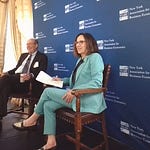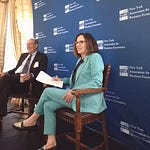David Andolfato, well known and respected in the world of central banking and monetary policy, is sympathetic with the position the Fed is in now as President Trump’s tariffs upend Fed Chair Jay Powell’s hoped-for soft landing, at least for now.
A Canadian from Vancouver B.C, coincidentally just a couple of hundred miles from Olympia, Washington where I grew up, he began his academic career as a professor of economics. In 2009, he was awarded the Bank of Canada Fellowship Award for his contributions in the theory of money, banking, and monetary policy. Our paths crossed when he had moved on to the Federal Reserve Bank of St. Louis as senior advisor to its former president, Jim Bullard and was part of the team run by former St. Louis Fed head of research - and now a Fed Board of Governor - Chris Waller. Need I say more?
So dive in and hear what Dave has to say. And let me know what you think.
UNCERTAINTY!! 00:01:06:14
Do I see a lot more uncertainty than usual? Oh, my goodness. I think I think that's absolutely the case. I mean, I think many of us most of us have been just dumbfounded at the rapidity of the shocks, the policy shocks, the tariffs on again, off again, the possibility of retaliatory measures, and, of course, other more pressing geopolitical events as well. I think it has caught a lot of people off guard. I mean, people were bracing for the new policy to crystallize with the new administration. But I do think that the manner in which these policies have been discussed and, you know, and basically discussed, because none have really been implemented at a large scale, have really created a lot of uncertainty for sure.
Removal of the ‘Balanced risk’ statement 00:02:16:10
I think you just take Jay (Powell Fed Chair) at his word. I mean, it was just tired language and it wasn't a suitable for the present statement. And, you know, the wordsmithing that goes on here, people try to divine something that's in every every little change. But at the end of the day, you know, you just want to clean up the statement and make it fit the current circumstances.
No rate hike possibility mentioned/ Most of the news that’s fit to print? 00:04:10:01
I think it's a little bit of a mistake not to be upfront about the possibility of hiking. Indeed, for the last year and a half, I've tossed that out as a possibility in light of the unfolding fiscal situation in particular. Certainly everybody, anybody who follows the Fed knows that the Fed follows a data contingent policy. And what that means is that should the circumstances dictate that the Fed will hike. So I think the Fed is just presuming that people do understand that and that the likelihood of that happening is perhaps not very high. And therefore, perhaps we need not emphasize that. I mean, this is how I interpret it. If it was me, I'd be very explicit about how the Fed is likely to react in all contingencies, but I think this is how I interpret it.
Inflation expectations readings are not in sync/ can alarming be charming? 00:06:11:11
Michigan survey is very important, I think, and the data that's coming out of there is a little bit alarming, I have to admit. But I do think that I mean, Jay did mention that there are other you know, there's a survey of professional forecasters. There's the tips measures, the Treasury Inflation-Protected securities break evens. There's the New York survey, and they all seem to paint a slightly different picture. So I think that it is prudent to watch Michigan's survey, but it should be viewed in the context of the other information that we have available as well. And if those other measures start ticking up in the same manner, that that's when the alarm bells will ring.
Tariffs are not the real problem 00:07:59:05
Think it kind of depends… the devil's in the details, really. But, you know, let me tell you, there's I think we need to make a conceptual distinction here between tariffs, the effects of tariffs, kind of the short run disruptions, the adjustment costs, and whether they're good for the economy along some dimension in the long run. So that's a separate debate one could have. But there's also the way in which the policy is being discussed is very antagonistic. It is haphazard. I mean, I have nothing against the idea of a tariff policy. I mean there are…trade agreements in place. <and then> they're on again, off again. There's the prospect of retaliatory measures or not, who knows? I'm not too worried about tariffs per say. I think that at some point the American economy is sufficiently resilient that if you have … you know, some sort of tariff or tax regime in place, that the economy will adjust itself to it.
The real problem is the approach -antagonist is BAD 00:08:46:18
And you do discuss these matters in a respectful manner with your trading partners. And so just the belligerence of the discussions kind of sends even more alarm bells for me. I mean, it makes me wonder how other types of policies are going to be discussed and implemented. So in terms of the tariffs themselves, I mean, we don't know exactly what is going to happen. The problem is, in the short run, the disruption, the uncertainty, the belligerence, the possibility of retaliatory measures. I mean, that's the part that concerns me a bit more.
Some slowing and shocks-but enough to create a recession? 00:10:44:16 -
So these shocks that are hitting us now are kind of hitting us in the context of an economy that is in a pretty good place, although it has shown signs of perhaps slowing down and no signs of recession. And so, you know, the other side of this, I mean, you see consumer sentiment measures kind of weakening a little bit. Whether or not these can in of themselves generate a recession, we have to wait and see, not just on the consumer side, But I think what's very important is the capital expenditure plans of companies. You know, you hear anecdotally that firms are kind of holding back on capex. They want some clarity. They want to know what's there and that type of spending freeze on the consumer side and on the business side, business capital formation could very well have caused the economy to slow into sufficiently that goes negative, so becomes recessionary.
Lots of fiscal juice makes prospect of recession remote 00:11:42:11
And, you know, the fiscal side is happily pumping in trillions of dollars of basically private sector wealth. And so deficits are still remain very high. The deficit, the GDP ratio, I think that in the context of this fiscal offset, I think the prospect of recession seems very remote.
Uncertainty is the real danger 00:12:44:24
You know, you might think that supply side reductions might so disruptions might elevate prices and scarce goods. And but in fact, you saw over the first year, you know, inflation actually came down. I mean, and what interpretation of that is that these types of disruptions, you know, have an inflationary effect of the type? I just described. But on the other hand, if people become worried, they start hoarding, they start to save. And that's a deflationary effect. Which of these two effects dominates is very difficult to say beforehand. And, you know, they might be a wash. And so this is why I think the Fed I mean, it sees, you know, potentially these this uncertainty disrupting the economy, especially in the short run, bringing economic weakness. I think these effects on inflation are roughly a wash.
Inflation will gravitate back to target- deviation is not a credibility problem 00:16:19:03
There was always the expectation that inflation would eventually come back to target. And I think that the same will hold true here. I kind of expect inflation to remain above target for a considerable amount of time. And, you know, I think, will this whittle away the Fed's credibility? I mean, I don't think so. I mean, as long as inflation stays within, you know, 50 basis points, even 100 basis points of target, you can explain, you know, you can always kind of do what they did in the previous, you know, era of seamless.
The Fed has integrity and credibility 00:16:59:18
I don't I don't think that the Fed’s credibility was damaged too badly. I shouldn't say this, actually. Maybe it was damaged so badly. I actually do believe that, you know, people most people do view the Fed is an institution that's, you know, an institution with integrity. And that they have these congressional mandates, that they're they're not politically motivated and they're driven to achieve their mandates. And I think to the extent that, you know, you have a person like Jay Powell up there and whoever replaces him, I think that Fed credibility should not be an issue here.
Team transitory warts and all 00:17:55:07
And that was another question that Powell was asked about in his press conference. Is team transitory back? Oh, well, we know we've already said inflation is going to be considerably higher this year than we thought it was going to be, and we were pretty sure it's going to come back down next year because then the tariff thing, they didn't exactly say it that way. It's going to be behind us as we it be worked into the system. But that that's a question that was not surprising to see him asked, Well, could you be wrong? What if this is like transitory with tariffs that you think inflation is going to go up, but then it won't come back down? Or is that is that just like kind of a to knee jerk little question that that he needn't worry about it? Well, I think he has to worry about the question and the optics here are terrible. But I mean I think the people asking these questions need to think a bit more carefully to to be quite honest. I mean, what does it mean to be transacting transitory? I say this because I was on team transitory as well. I had a different perhaps a different, slightly different definition of what I meant by transitory.
David Andolfatto received his Ph.D. in economics in 1994 from the University of Western Ontario, London, Canada. A native of Vancouver, British Columbia, he began his academic career in Canada as a professor of economics. In 2009, he was awarded the Bank of Canada Fellowship Award for his contributions in the theory of money, banking, and monetary policy. In that same year, David left Canada to become Vice President, and then Senior Vice President, in the research division of the Federal Reserve Bank of St. Louis, where he served as a senior policy advisor for James Bullard, CEO and president of the Bank. He left the Fed in 2022 to become Chair of the Economics Department at the University of Miami Patti and Allan Herbert Business School.













Share this post